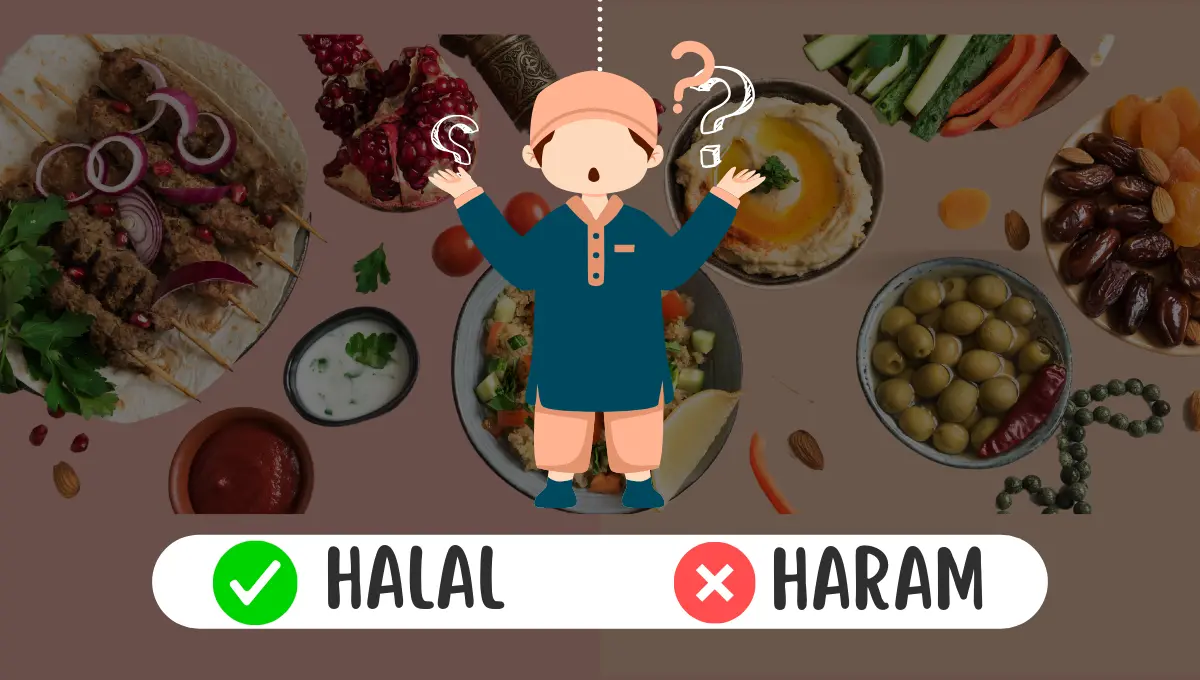Islam is the only religion which provides guidelines around halal and haram food, and Islam also provides a List of Halal and Haram foods for their followers.
Islam makes these classifications based on the interpretations of Islamic law and has implications for the diets of Muslims.
If we follow all the haram or halal concepts in our lifestyle, it ultimately makes our faith strong and influences other people to take care of their faith.
Let us understand the meaning of halal and haram in Islam and which certain categories of food are halal.
Understanding Halal and Haram Food
Understanding halal and haram food is essential for Muslims who adhere to Islamic dietary guidelines.
Here’s a summary:
What is Halal Food?
Halal food refers to food that is permissible and lawful in Islamic law (Sharia). The term “halal” is an Arabic word that means “permissible” or “lawful,” and it is the opposite of “haram,” which means “forbidden” or “prohibited.” It means something is allowed to be consumed in Islam, and we can eat that particular food without any doubt. It is called halal food.
What is Haram Food?
“Haram” is an Arabic term that means “forbidden” or “prohibited” in Islamic law (Sharia). Haram food refers to food and beverages that are considered unlawful or impermissible for Muslims to consume according to Islamic dietary guidelines. Haram is the Arabic word opposite to Halal; it means something is forbidden or unlawful for Muslims to consume.
List of Halal Foods and Haram Foods
In this, there are many foods which we take. But according to Islam, there are some particular halal and haram foods on the list is Islam.
These halal and haram food list classifications are based on the interpretations of Islamic law and have implications for the diets of Muslims.
List of Halal Food in Islam
Here is a list of halal foods in Islam:
- Meats and Poultry: Beef, lamb, goat and chicken (must be slaughtered according to Islamic dietary law). Bison, deer, turkey and game birds
- Seafood: All fish and seafood (Prohibit the consumption of fish without scales)
- Dairy Products: Milk, cheese, cream, butter, and yoghurt (must not contain non-halal additives)
- Plants and Vegetables: Fruits and vegetables, Legumes, nuts, seeds, grains and cereals
- Bread and Grains: Breads, cereals, pasta, rice (should not contain haram ingredients)
- Oils and Fats: Vegetable oil, nut oils
- Spices and Condiments: Salt, pepper, soy sauce, spices
- Beverages: Water, juice, tea, coffee (without alcohol)
- Sweets: Honey and non-alcoholic desserts
- Miscellaneous: Vinegar, stuffing, parsley, gelatin (from halal sources)
List of Haram Food in Islam
Here is a list of haram (prohibited) foods in Islam:
Meat and Poultry:
- Pork and pork products
- Carnivorous animals (lions, tigers, bears, etc)
- Birds of prey
- Domesticated donkeys and mules
- Animals slaughtered incorrectly or not in God’s name
Alcohol and Intoxicants:
- Alcoholic beverages like wine, beer, vodka, etc
- Alcoholic derivatives like vanilla extract
Blood and Blood By-products:
- Blood
- Foods with blood plasma or blood cells
Contaminated Foods:
- Food touched by haram meat/alcohol
- Dishes, plates, utensils contaminated by haram
Other:
- Carnivorous plants like Venus flytraps
- Insects except locusts
- Reptiles except seafood
Any food plant or animal that does not cause harm is halal in Islam.
The main prohibitions relate to pork, alcohol, meat not slaughtered according to Islamic guidelines, and foods contaminated with any of these products.
Conclusion
There are various hadith and verses of the holy Quran which clearly instruct for halal and haram food.
“O ye who believe! Eat of the good things wherewith We have provided you, and render thanks to Allah if it is (indeed) He whom ye worship”
(2:172).
“He hath forbidden you only carrion, and blood, and swineflesh, and that which hath been immolated to (the name of) any other than Allah. But he who is driven by necessity, neither craving nor transgressing, it is no sin for him. Lo! Allah is Forgiving, Merciful”
(2:173).
-On the authority of Abu Huraira (may Allah be pleased with him), who said: The Messenger of Allah said: “Allah the Almighty is good and accepts only that which is good. Allah has commanded the Faithful to do that which He commanded the Messengers, and the Almighty has said: “O ye Messengers! Eat of the good things, and do right..” (Quran 23:51). And Allah the Almighty has said: “O ye who believe! Eat of the good things wherewith We have provided you..” (2:172). Then he mentioned [the case of] a man who, having journeyed far, is disheveled and dusty and who spreads out his hands to the sky [saying]: O Lord! O Lord!-while his food is unlawful, his drink is unlawful, his clothing unlawful, and he is nourished unlawfully, so how can he be answered!” (Muslim).
All these verses and hadith clearly tell us how we can be good believers and how we can take care of Imaan.
There are lots of non-Muslim people who do care about eating halal and haram; Islam and Muslims are special near Allah, and that’s why Allah SWT give us this opportunity to take care of our faith (Iman).
























Post Comment